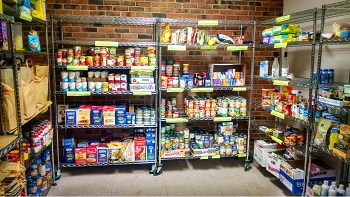By: Hawraa Rikan, Food Studies Intern
The food industry produces massive amounts of surplus each year, yet food insecurity remains an issue throughout our nation, especially on college campuses.
Food insecurity is defined as a lack of access to sustainable, nutritious food. When we think of hunger, we think of third-world countries, in which oftentimes an economy is suffering and unable to feed its population. But why do we have hunger in a country that has literally plenty to feed both its people and others outside its borders? Answering this question involves taking a closer look at the interconnection of policy, economics and power.
Hunger is a major issue in our community, affecting one in four children and one in six adults in Maine, according to the Good Shepherd Food Bank report. Food insecurity is all around us. It is in our state, city, neighborhood, as well as on our college campus. In fact, the food insecurity rate is higher on college campuses than the national average rate of 12.7 percent.
Imagine preparing yourself for final exams and you decide to give your body the fuel it needs; food, in order to better concentrate on your studies. If you do have food to eat, you are fortunate because others around you may not. A high percentage of college students reported being food insecure during their college experience.
Lisa Henry, author of Understanding Food Insecurity Among College Students: Experience, Motivation, and Local Solutions, stated that food insecurity negatively impacted college student’s academic performance, as well as their social and mental health. Henry mentioned a link between low GPA and food insecurity but mentioned there are other variables involved, thus requiring more research into the correlation between food insecurity and lower GPAs.
Many college campuses recently implemented a food pantry for its student population, which is a great first step, however, it comes with a stigma that is rarely discussed. Many students who experience hunger are often embarrassed or ashamed of reaching out for help. Not everyone is comfortable showing their vulnerable side and we are sometimes unaware of others around us.
When was the last time you checked on classmates, family members, or close friends about how they were doing, with an honest intention of caring? Sometimes the most valuable thing you can give is your time. Some of us are hungry for food, but a lot of us are hungry for basic human interaction that has been replaced by technology, but that’s another topic.
Henry’s article on food insecurity mentions the importance of having confidential resources for students in order to combat the shame that comes with using food pantries by protecting student privacy. Other solutions were mentioned included having leftovers from the college dining room be put in the food pantry for all students in need to utilize, as well as reducing the cost of meal plans.
I believe the USM could and have utilized many of the solutions mentioned in Henry’s article. The Food Studies Program at USM has in many ways raised more awareness in regard to food insecurity on our campus and community, but there is much more to be done and it takes collective action.
I am proud that the national 2019 Universities Fighting World Hunger Summit will happen in the North East for the first time ever, and at USM! It will bring more than 500 students, faculty, and speakers to discusses the policy, economic and power aspect of food insecurity.

